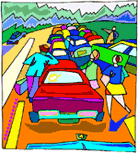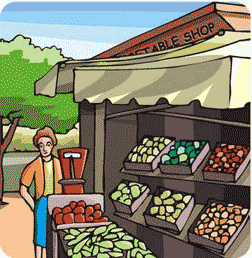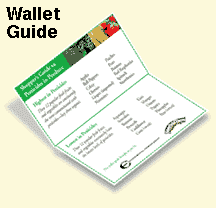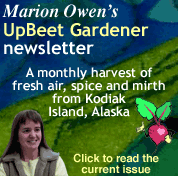
What's in Your Food?
The most and least contaminated fruits and vegetables
By Marion Owen, Fearless Weeder
for PlanTea, Inc. and
Co-author of Chicken Soup for the Gardener's Soul
FEATURE ARTICLE:

Tom Hanks' "Power of Four" solution
More good stuff:
Who is Marion Owen?
FAQs about PlanTea
Search Marion's articles, tips and recipes
Why grow organic?
News and press releases
Read love letters
How to link to this site
Need a speaker?
How to contact Marion
Visiting Alaska?
Come to Kodiak Island!
Go to home page

Marion's UpBeet Gardener
Newsletter has been
replaced by Marion's blog
which you can find at:
www.marionowen.wordpress.com
 Did
you know there is a report card that rates, not reading, writing and arithmetic
skills, but pesticide contamination for 43 fruits and vegetables?
Did
you know there is a report card that rates, not reading, writing and arithmetic
skills, but pesticide contamination for 43 fruits and vegetables?
The list is based on an analysis of over 100,000 tests on these foods, conducted from 2000 to 2004 by the U.S. Department of Agriculture and the Food and Drug Administration.
What are pesticides, and what do they do?
Pesticides are used to kill bugs, weeds and other pests, and there is growing consensus in the scientific community that small doses of pesticides and other chemicals can adversely affect people, especially during fetal development and childhood.
For an excellent resource about pesticides, look into the Northwest Coalition for Alternatives to Pesticides, (NCAP). Their mission: to protect people and the environment by advancing healthy solutions to pest problems.
Shoppers would be wise to minimize exposure to pesticides whenever possible, a stand taken by Washington, DC-based The Environmental Working Group (EWG), which has compiled the data into a handy, wallet-sized guide called The Shopper's Guide to Pesticides in Produce. You can download a copy from the EWG's Food News website. The site also provides the full list of 43 Fruits and Veggies.
Of course, the ultimate solutions are found right in your own yard and kitchen! One solution is to grow your own produce (organically, of course!) even if it's just a fraction of what you buy. Discover how and why in my articles: Why Grow Your Own Food, Easy Ways to Avoid Junk Food. Would you like to make your landscsope do double duty? Landscape with edible plants! |
Meanwhile, the wallet guide lists the 12 fruits and vegetables with the highest and lowest levels of pesticides.
 The
MOST contaminated produce includes:
The
MOST contaminated produce includes:
- Apples
- Bell Pepper
- Celery
- Cherries
- Imported Grapes
- Nectarines
- Peaches
- Pears
- Potatoes
- Red Raspberries
- Spinach
- Strawberries
The LEAST contaminated fruits and veggies include:
- Asparagus
- Avocados
 Bananas
Bananas- Broccoli
- Cauliflower
- Sweet corn
- Kiwis
- Mangos
- Onions
- Papaya
- Pineapple
- Sweet peas
Fruits and vegetables are essential to a healthy diet, so you don’t want to cut back on them. But you can cut back on pesticides. The best option is to choose organic whenever possible. If organic produce is not available, then select the least contaminated foods. Finally, though it only takes care of the outside and not what's on the inside, be sure to wash all produce.
Also of interest...
Would you like to learn how to decipher those little labels on produce? Visit my article on Genetically Modified Foods.
Thanks for visiting. Cheers, ![]()
![]()
Thanks for visiting and please stop by again. I'll put the coffee on!
Meet Marion Owen /// Learn about PlanTea /// Online Catalog /// Articles, Tips, Recipes /// Get free UpBeet Gardener newsletter /// Read current issue /// Listen to radio show /// Read news and press releases /// More resources and links /// Learn why 'grow organic?' /// View guidelines for retailers /// Read love letters /// Book Marion as a speaker /// Site map /// How to link to us /// Contact us /// Go to home page
PlanTea: The organic plant food in tea bags. http://www.plantea.com
Copyright ©1996 to present: PlanTea, Inc. All Rights Reserved. PO Box 1980, Kodiak, AK 99615-1980 USA
Questions or comments? marion@plantea.com Phone: Toll Free: 1-800-253-6331 (US and Canada); 907-486-2500